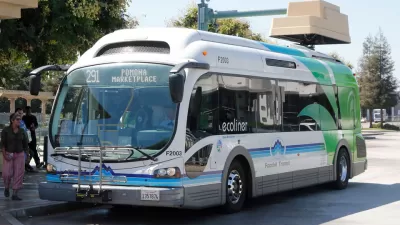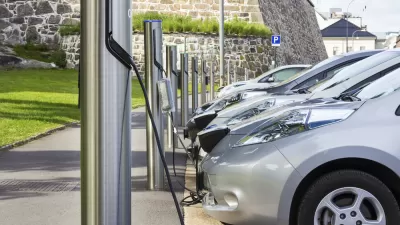The investment comes not from the state legislature but from two regulatory bodies, the Air Resources Board and the Public Utilities Commission, authorizing the expenditure of VW settlement funds and utility ratepayer funds, respectively.

"Today, after years of drafting this blueprint, the California Public Utilities Commission (CPUC) approved the largest single investment in charging infrastructure in U.S. history," writes Adrian Martinez, staff attorney for Earthjustice on May 31. "The $738 million investment [pdf], combined with the $300 million in zero-emissions VW 'Dieselgate' funds approved last week, means California decided to go all in with a jaw-dropping billion dollars approved for electric vehicles in this month alone."
"The programs unanimously approved Thursday by the California Public Utilities Commission focus on creating the infrastructure to support charging stations particularly for electric trucks and buses, in contrast to previous expenditures, which have focused more on cars," reports David R. Baker who covers electric vehicles for the San Francisco Chronicle. Funded by the utilities’ customers, the projects "place an emphasis on installing charging stations in disadvantaged communities or in facilities — such as ports — that tend to be located near low-income neighborhoods."
Baker lists the investments to be made by big-three investor-owned utilities in the state: Pacific Gas and Electric Co., Southern California Edison, and San Diego Gas & Electric Co.
Gov. Jerry Brown has set a goal of having 5 million zero-emission vehicles on California roads by 2030, a steep jump from the 369,300 pure electrics and plug-in hybrids now registered in the state.The programs come in response to a 2016 California law — SB 350 — that directed the commission and the utilities to develop ways to electrify transportation across all sectors of the economy.
[See Planetizen: "Will Electric Utilities Disrupt the Oil Industry in California?" October 29, 2015: A key bill had language allowing public utilities to enter into the electric vehicle charging industry—overlooked by the oil industry and a game-changer for EVs as it tackles one of their most formidable challenges.]
Controversy on Volkswagen Environmental Mitigation Trust spending plan
The CARB vote on May 25 to approve the "Beneficiary Mitigation Plan for the State’s $423 million allocation of the Volkswagen Environmental Mitigation Trust" [pdf] was 12 to 2, unlike the unanimous CPUC vote on May 31.
"Some pushback came from several of CARB's 16 board members, echoed in public comments during the Friday session," reports Russ Mitchell for the Los Angeles Times on May 25.
They said CARB is focusing too much on electric vehicle development and not enough on near-term policies that would convert diesel engines to natural gas, which they said would clear that air faster and cheaper. Because all-electric vehicles cost so much more than retrofits, not enough will be sold in coming years to match retrofits for far cheaper emissions reductions, some contend.
Only $60 million of the $423 million will be spent on making existing diesel heavy vehicles more efficient, through modifications including a conversion to natural gas, although that approach will account for 70% of nitrogen oxide emission cuts.
The issue is important when placed into context with the state's total VW settlement award of $1.3 billion, with $800 million targeted for zero-emission vehicle investment, and "about $422 million to California to replace older, dirtier heavy-duty vehicles and equipment with cleaner versions," according to CARB's July 27, 2017 press release.
New York and New Jersey investments in electric charging infrastructure
"In New York, the governor’s office announced a pledge of up to $250 million through 2025 to its electric vehicle expansion initiative, EVolve NY, [a program of the New York Power Authority]" reports Sean O'Kane for The Verge on June 1.
New Jersey’s biggest utility owner Public Service Enterprise Group (PSEG) announced a $300 million pledge to build out up to 50,000 charging stations along highways, in residential areas, and at workplaces.
Correspondent's note to clarify CPUC expenditure plan: The Chronicle lists $768 million while Earthjustice indicates $738 million. "The budget for these projects is approximately $738 million, with a further $29.5 million for program evaluation," according to CPUC.
FULL STORY: Energy revolution: California approves $768 million for electric vehicles

Maui's Vacation Rental Debate Turns Ugly
Verbal attacks, misinformation campaigns and fistfights plague a high-stakes debate to convert thousands of vacation rentals into long-term housing.

Planetizen Federal Action Tracker
A weekly monitor of how Trump’s orders and actions are impacting planners and planning in America.

San Francisco Suspends Traffic Calming Amidst Record Deaths
Citing “a challenging fiscal landscape,” the city will cease the program on the heels of 42 traffic deaths, including 24 pedestrians.

Defunct Pittsburgh Power Plant to Become Residential Tower
A decommissioned steam heat plant will be redeveloped into almost 100 affordable housing units.

Trump Prompts Restructuring of Transportation Research Board in “Unprecedented Overreach”
The TRB has eliminated more than half of its committees including those focused on climate, equity, and cities.

Amtrak Rolls Out New Orleans to Alabama “Mardi Gras” Train
The new service will operate morning and evening departures between Mobile and New Orleans.
Urban Design for Planners 1: Software Tools
This six-course series explores essential urban design concepts using open source software and equips planners with the tools they need to participate fully in the urban design process.
Planning for Universal Design
Learn the tools for implementing Universal Design in planning regulations.
Heyer Gruel & Associates PA
JM Goldson LLC
Custer County Colorado
City of Camden Redevelopment Agency
City of Astoria
Transportation Research & Education Center (TREC) at Portland State University
Jefferson Parish Government
Camden Redevelopment Agency
City of Claremont





























